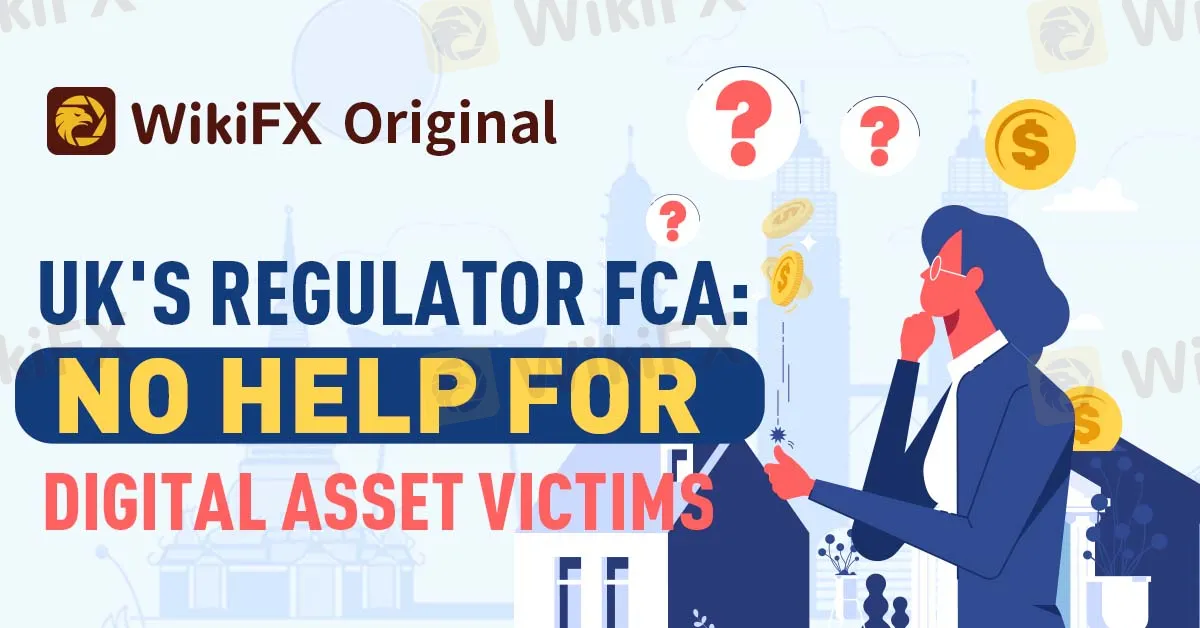简体中文
繁體中文
English
Pусский
日本語
ภาษาไทย
Tiếng Việt
Bahasa Indonesia
Español
हिन्दी
Filippiiniläinen
Français
Deutsch
Português
Türkçe
한국어
العربية
UK's Regulator FCA: No Help for Digital Asset Victims
Abstract:The Financial Conduct Authority (FCA) issued a warning on November 14, 2022, stating that the defunct FTX cryptocurrency exchange was outside of its regulatory authority and that UK investors may only get assistance through a link to a general financial advice helpline.

The UK's financial markets regulator, the Financial Conduct Authority (FCA), has provided a brief reminder for worried British FTX clients. The organisation alerts the public that it has no regulatory authority over cryptocurrency. Thus, investors will likely be left to handle this messy issue on their own.
The FCA makes reference to reports that the bitcoin exchange FTX has declared bankruptcy in the United States and liquidation in the Bahamas. Without getting into specifics, the market watchdog regulator promises that further information will be released in the following days.
Since the FTX exchange was not a regular investing firm, it was neither approved nor subjected to FCA regulation. As a result, the regulator can only offer free, unbiased financial guidance to the victims of the FTX havoc via a general financial advice hotline.

It is as if the occurrence of this event was predicted much earlier by the FCA. In September 2022, the FCA pinpointed that FTX did not possess the requisite license to offer goods or services within the nation. In conjunction with that statement, the FCA also warned that FTX is targeting people in the UK who could lose a significant amount of money and face difficulty recovering their investments. Shockingly, this prophecy came to pass in less than 2 months' time.
The FCA's criticism of FTX came while the troubled cryptocurrency exchange was dealing with a serious liquidity crisis following a surge of customer withdrawals last week. The Bahamas-based cryptocurrency asset platform filed for bankruptcy after users attempted to withdraw $8 billion in a short period of time out of concern that it would go bankrupt. That was the equivalent of a bank run, where several depositors withdraw their funds at once.

In order to maintain Britain's status as a financial hub across the world, the FCA must put pressure on regulators while keeping the country's doors open. According to the watchdog's chief executive Nikhil Rathi, the FCA is under pressure because 85% of licence requests from crypto trading firms have either been denied or withdrawn as they lack FCA certification for their anti-money laundering systems. Thus, cryptocurrency exchanges like the market leader Binance and FTX are prohibited from operating in Britain. The City watchdog has been the UK's anti-money laundering and counter-terrorist funding supervisor since January 2020. At that time, the FCA launched a registration programme for companies that deal in crypto assets, with a one-year grace period.
At present, as the nation tightened its supervision of the area, roughly 70 cryptocurrency businesses withdrew registration applications they had previously submitted. These businesses have to stop operating in the UK by withdrawing their applications, but the FCA is still reviewing more than 200 businesses.

Disclaimer:
The views in this article only represent the author's personal views, and do not constitute investment advice on this platform. This platform does not guarantee the accuracy, completeness and timeliness of the information in the article, and will not be liable for any loss caused by the use of or reliance on the information in the article.
Read more

Tether Reacts to MiCA Regulations as Crypto.com Delists USDt in Europe
Tether criticizes MiCA-triggered delistings in Europe, warning of market risks. Crypto.com removes USDt and 9 other tokens to comply with EU crypto regulations.

Kraken Brings Back Crypto Staking for U.S. Users as Regulations Ease
Kraken reintroduces crypto staking for U.S. users in 39 states, supporting 17 assets with slashing insurance as regulations ease.

Trump Media Expands into Crypto with $250M Truth.Fi Investment
Trump Media & Technology Group launches Truth.Fi, investing $250M in crypto and financial services, aiming to revolutionize decentralized finance.

Crypto.com Delists USDT and 9 Tokens to Comply with MiCA Regulations
Crypto.com delists USDT and 9 tokens to comply with MiCA regulations. Users must withdraw assets by March 31. Learn more about MiCA’s impact on stablecoins.
WikiFX Broker
Latest News
Fake ‘cyber fraud online complaint’ website Exposed!
Day Trading Guide: Key Considerations
NAGA Launches CryptoX: Zero Fees, 24/7 Crypto Trading
Scam Alert: 7 Brokers You Need to Avoid
AvaTrade Launches Advanced Automated Trading Tools AvaSocial and DupliTrade
What Determines Currency Prices?
Why More Traders Are Turning to Proprietary Firms for Success
How to Use an Economic Calendar in Forex Trading
MC Markets Review 2025
T4Trade Enhances Forex Trading with Advanced Tools for 2025
Currency Calculator






